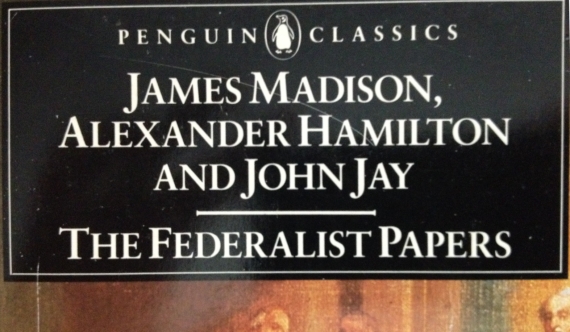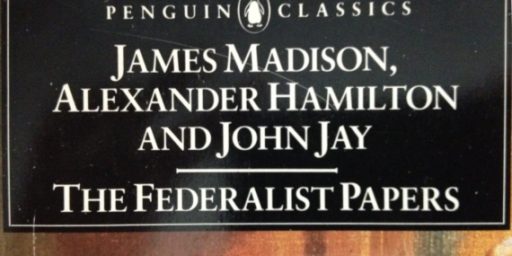The Anti-Federalist Impulse
Many who speak with great passion about the Constitution rather frequently make anti-Federalist arguments.
 One of the remarkable aspects of a great bit of the political philosophy of the Tea Party movement and their fellow travelers (such as the anti-BLM protesters) is that while they speak with great passion about the Constitution and the Founding Fathers (and especially the Framers of the Constitution) they actually rather frequently make anti-Federalist arguments.* The anti-Federalists were those who opposed the ratification of the US Constitution, typically on the grounds that that states ought to continue to retain their power positions under the Articles of Confederation (the US’s first constitution, more or less, that was in place from 1777-1789).
One of the remarkable aspects of a great bit of the political philosophy of the Tea Party movement and their fellow travelers (such as the anti-BLM protesters) is that while they speak with great passion about the Constitution and the Founding Fathers (and especially the Framers of the Constitution) they actually rather frequently make anti-Federalist arguments.* The anti-Federalists were those who opposed the ratification of the US Constitution, typically on the grounds that that states ought to continue to retain their power positions under the Articles of Confederation (the US’s first constitution, more or less, that was in place from 1777-1789).
One of the massive mistakes made by those on the rightward side of the debate who claim the sacred nature of the Constitution is the assertion that the Framers were states rights activists or that the goal of the constitution was to constrain the federal government vis-à-vis the states. While there is a debate to be had over the appropriate scope of the federal government, as well as the meaning of things like the 10th Amendment, the commerce clause, and the general welfare clause, there is no debating that the whole goal of the US Constitution was to create a strong, viable central government. It is indisputable that the US Constitution was written and deployed to give the federal government more power over the states than had previously existed (not the other way around as some would have it). Yes, there are limits placed on the federal government, but the Constitution itself was not created in the context of the need to constraint government, it was created in the context of the need to create a viable, functional government (and one that was demonstrably more powerful than that which existed under the Articles of Confederation). The argument for true state-level sovereignty was an anti-Federalist, pro-Article of Confederation argument. Indeed, if the Framers had wanted a tiny central government that was subordinate to the states they already had one and therefore had no reason to meet in Philadelphia in 1787.
To quote James Madison from a letter to George Washington in April of 1787: “I would propose that…the national government should be armed with positive and compleat authority in all cases which require uniformity; such as the regulation of trade, including the right of taxing both exports and imports, the fixing the terms and forms of naturalization, etc. etc.”
This man, the venerated “Father of the Constitution” wanted to put “compleat authority” over certain policy areas in the hands of the central government. This was an argument for the augmentation of that central government, and a sizable augmentation at that, as the central government under the Articles was quite anemic (indeed, it barely existed). Yes. there are areas of shared power between the central government and the states, and there are even areas of policy that reside solely in the hands of states. Those facts, however, do not undercut the simple fact that the government under the US Constitution represented the destruction of the confederal order that pre-existed it in which states were fully sovereign entities..
As such, when Cliven Bundy made these statements (source), he was hearkening not to the constitutional order, but instead to the anti-federalist cause:
“I believe this is a sovereign state of Nevada,” Bundy recently told a radio reporter. “…I abide by all of Nevada state laws. But, I don’t recognize the United States Government as even existing.”
Host: “So essentially you have a deal already with Nevada and the Bureau of Land Management is essentially trying to revoke or renege that deal?”
Cliven Bundy: “Yeah, it gets back to the ownership of this. Who owns this land? Does the sovereign State of Nevada own this land within their borders? Or does the United States own this land with their borders? If United States owns this land then I guess I’m wrong. But what if this is a sovereign State of Nevada and Clark County, Nevada owns this land? The People of Clark County, Nevada owns this land.”
This strikes me as being what Alexander Hamilton called the ”inordinate pride of State importance” in Federalist 20.
If one is going to argue that, ultimately, the states should supersede the federal government, then one is not making federalist (i.e., pro-constitution) arguments, one is making an anti-federalist (i.e., anti-constitution) arguments. Bundy’s focus here, in the face of clearly established law (not to mention the constitution of Nevada) on his state and county are, to be colloquial, kickin’ it old school. This kind of thinking led to the Whiskey rebellion (put down by Framer and Founder’s Founder, George Washington).
If one wants to see the Framers’ views of a system in which state power can trump federal power (i.e., a confederation) one need look no further than Federalist 15-22 (not to mention the text of the Constitution itself).
From those numbers I will end with this quote from 16, which strikes me as especially relevant to the Bundy Ranch business (emphasis mine):
The result of these observations to an intelligent mind must be clearly this, that if it be possible at any rate to construct a federal government capable of regulating the common concerns and preserving the general tranquillity, it must be founded, as to the objects committed to its care, upon the reverse of the principle contended for by the opponents of the proposed Constitution. It must carry its agency to the persons of the citizens. It must stand in need of no intermediate legislations; but must itself be empowered to employ the arm of the ordinary magistrate to execute its own resolutions. The majesty of the national authority must be manifested through the medium of the courts of justice.
An Addition: It should be noted that having an anti-Federalist impulse, or making an anti-Federalist argument does not make one wrong. I am not arguing that the Framers are sacred and always right, nor am I suggesting that right thinking Americans have to agree with Hamilton and Madison. What I am saying, however, is that it is utterly inconsistent to claim the Framers as one’s moral foundation while parading around with the US Constitution one’s shirt pocket and then arguing from the anti-Federalist POV. At a minimum it shows that one does not understand one’s own arguments. Mostly it is just a constant source of amazement to me that those who are the most vocal about the Constitution and the Founding generation get it so wrong most of the time. I would much prefer it if these folks would simply say, “You know, the anti-Federalist had a point about X, Y, and Z” (but that would mean that the Constitution isn’t perfect, which would create its own set of difficulties for them).
—
*For example, see Brutus’ concerns about Article I, Section 8.






@Steven:
The frightening thing about all that, Steven, is that they experience not a shred of cognitive dissonance in regard to the thing.
@dennis: Can it even be called “cognitive dissonance” when there’s no indication of cognition, merely repetition of inane talking points?
People (especially on the right) treat the Constitution the same way they treat The Bible: as an all-purpose vehicle for supporting whatever wishes percolate up from their id. They want X, therefore the Constitution supports X. The actual text is irrelevant. The Constitution/Bible exists to empower them, and them alone, while constraining all others.
Humans are largely driven by greed, by pride, by lust, by sadism. A disappearingly small percentage of the human race is willing to subordinate their darkest emotional needs to the common good. Those that are we call liberals.
Where the fleeping hurk does this moron think the “sovereign State of Nevada” came from? I mean, I can (barely) imagine someone trying to claim that Maryland or even Texas, as a political entity that became a US State later, might have some sort of prior claim to certain things. But Nevada? “The federal government won you by conquest from Mexico, kicked out the natives, and gave it to you” Nevada? Really?
Of course, the original tea party, from which the current groupings draws inspiration, had nothing to do with federalism. To have an affection for the Boston Tea Party does not have anything to do with the issues fifteen years later.
Further, fifteen years later Massachusetts was divided between the federalists and anti-federalists, and ultimately adopted a conditional ratification of the federal Constitution, which meant that limits on federal power were necessarily a condition of support. In particular Massachusetts wanted an all powers not expressly granted to the federal governments are reserved to the states clause, something quite at odds with the implied powers argued for in the Federalist Papers.
It should be noted that the Bill of Rights was largely the work of the anti-federalists, so while your comments about the core Constitution being intended to empower the federal government are correct, the anti-federalists certainly left their stamp on the Constitution we have now.
@Stormy Dragon: Well, I would say that the BoR was, in some significant measure, a response to concerns raised by the anti-Federalist (among others), but I am not sure that I would agree that “the Bill of Rights was largely the work of the anti-federalists” (especially since most of the BoR was authored by Madison).
Massachusetts conditionally ratified the Constitution with a number of proposed amendments, including:
Which reads remarkably like the 10th Amendment. Madison did not author the Bill of Rights, he edited the proposals of others and the contents of state constitutions. He did so against his better judgment, initially opposing a Bill of Rights, but after Patrick Henry cost him a Senate seat and nearly pushed him out of any national office, he felt it prudent to “satisfy[] the minds of well meaning opponents.”
Over 50 years ago people like Bundy were either left alone in isolated venues like the high deserts of Nevada or the backwoods of Idaho and Montana – or – when it was safe to do so, committed to a Psychiatric Hospital, where they later became the subject of novels like “One Flew Over The Cuckoo’s Nest.”
I am grateful that a person like Bundy is neither in, nor near, my community.
@PD Shaw: I am not arguing that there were no political divisions in the 1780s nor that there was no debate over the role of the federal government at the time. I am arguing that it is nonsensical to treat the Constitution and the Framers as perfect and then make anti-Federalist arguments.
@al-Ameda: While I find the Bundy’s and their supporters on the ground quite frustrating, my main concern is with those outside the events in question (in the broader political culture) who see him as a hero.
@Steven L. Taylor: @Stormy Dragon:
Living where I do, within spitting distance of George Mason University and Gunston Hall and George Mason Boulevard etc., I’d have to say that @Stormy Dragon had it right. If any one person can claim to be “the author of the Bill of Rights”, it’s George Mason, who based it closely on the earlier Virginia Declaration of Rights — which he had also written. Mason was clearly a strong advocate of state’s rights and limitations on federal powers.
The Tea Partiers are misnamed. Most of those in the original Tea Party went on to fight to establish a powerful Federal government. Today’s Tea Party are the descendants of the Whiskey Rebels – a bunch of arrogant, violent pricks who got mad when government policy benefited some other citizens instead of them.
@DrDaveT: Yes, Mason was a key contributor. I have no problem acknowledging that. He was, at least, at the convention (although he did not sign).
However. my point is not about post-ratification politics as it is about pre-ratification politics.
And even if one wishes to focus on the 10th amendment, that really is not what I am talking about here where Bundy and his ilk are placing state (indeed, county) government over the central government.
@Stormy Dragon:
Yes and no. The existence of the bill of rights and things like the tenth amendment don’t change the fact that a constitution is already a declaration of what the government can and can’t do. And in this case the Constitution is inherently an empowering of the federal government relative to the previous government structure. The idea that a bill of rights was necessary is almost undermining to the concept of a constitution in and of itself (i.e. if the tenth amendment actually limits the federal government, then implication is that the constitution without the tenth amendment places no limits on the federal government). But the history has born out the anti-federalist argument so in that sense, I agree with you. However, on the point of contention, the US Constitution is fundamentally a document that increased the power of the central government.
@Heisenberg: “Most of those in the original Tea Party went on to fight to establish a powerful Federal government.”
Nobody fought to establish a powerful Federal government; the war ended with a weak confederate government, and most people drifted back to their lives satisfied that the British were gone. It was almost entirely through the peaceful efforts of Hamilton and Madison that a peaceful establishment of federal system occurred.
The Bostonians that participated in the Tea Party were drunken populists that embraced a variety of conspiracy theories about the true motivations of the British government, including the belief that they would be forced to become Catholic. And I don’t believe many from Massachusetts necessarily went south following Bunker Hill. I know my ancestors didn’t.
@Steven L. Taylor: The point of your post is to raise the Tea Party on its own petard by challenging them to adherence to original principles of Federalism. Which is silly given, that the original Tea Party did not adhere to the original principles of Federalism.
@M. Bouffant:
Well, M., my opinion is that they believe they are right in their cause; otherwise, how could they stand to look themselves in the mirror every day? So, I think there exists cognition of beliefs they hold within their bubble of existence. Which, I guess, goes to your point. Hahaha! Point, M.!
@PD Shaw: “Which is silly given, that the original Tea Party did not adhere to the original principles of Federalism’
The original Tea Party also didn’t insist that Jesus wrote the constitution, and that it is a perfect document.
@PD Shaw:
You seem to be asserting in this thread that the modern day Tea Party is claiming to be an exact replica of the original. This is, of course, not the case. They chose the name and part of the legend as they understood it (i.e., throw tea in the harbor to protest taxes). They never claimed to be a replica of the original (and I am not so sure that most modern Tea Partiers really have any idea about the exact nature of the original).
I never made any claims about the original Tea Party (and am not even sure how they are relevant to this post).
My point is pretty clear and has nothing to do with what they call themselves: the Tea Party, the Bundy’s, and many others who claim a great deal of fealty to the Founder Fathers and the Constitution often make arguments that cleave more to the anti-Federalist line than to the Federalist line of thinking.
This claim has nothing to do with the original Boston Tea Party.
Federalist or Anti-federalist…I’m pretty sure the founding fathers would look askance at a deadbeat who refuses to pay his bills.
Those guys out there in Nevada aren’t really thinking Federalist or anti-Federalist-they’re just “agin that illegitimate Federal Gumint headed by that Kenyan Muslim usurper in the White House.”
If Memeorandum is anything to go, the right wing BS machine has already moved on to another topics and are OK with letting the “militiamen” rot in the sun.
@PD Shaw: There is some conflation of Tea Partiers with avowed Constitutionalist conservatives, probably because in the heady days of 2011, that’s what Tea Partiers were doing. Focusing on the name and inspiration is a red herring distracting from the substance of their views.
PD- In the particular case of Bundy and many of his supporters, they actually believe that the Constitution is divinely inspired.
” D&C 101:77, 80: 77 According to the laws and constitution of the people, which I have suffered to be established, and should be maintained for the rights and protection of all flesh, according to just and holy principles;
And for this purpose have I established the Constitution of this land, by the hands of wise men whom I raised up unto this very purpose, and redeemed the land by the shedding of blood.”
To then support a position consistent with the Articles of Confederation is weird, to say the least. While many others supporting Bundy wont go so far as to say it is divinely inspired, they come close to treating it that way, or at least their perceptions of what they think it says.
Steve
@Steven L. Taylor:
Steven, I agree with you that there is a larger concern here.
However, speaking honestly to those larger historical constitutional and federalist issues is completely lost on these people. They’re “evangelicals” in service to anti-government ideology, and they do not care what the words are, either in context or as interpreted by historians and constitutional scholars. They’re going to cherry-pick phrases, and lift them completely out of context in order to give themselves a fig leaf of justification for their anger and paranoia.
For those unfamiliar, Steve is referencing Mormon texts:
https://www.lds.org/scriptures/dc-testament/dc/101.80?lang=eng
Ironically, it’s the Articles of Confederation, not the Constitution, that explicitly invokes the Creator’s role in the creation of said document.
@al-Ameda:
There is little doubt that there are many who are not amenable to having their minds changed. Others, however, might be.
Still, it is an occupational hazard to assume that somebody, somewhere might find these discussions useful.
@Steven L. Taylor:
Absolutely. These issues have to be discussed – I can think of no other way for a Democratic Republic to function.
@Steven:
Based on a few years of participating in these discussions here at OTB, my observation is that most people actively presenting/defending these opinions will probably never be swayed. As you put it once: Quod nescis aut non libet cogitare. (In latin to sexy it up)
That said, I am always hopeful that the “seeds of doubt” that we sow will find fertile ground among those who read but do not comment.
@Matt Bernius:
I’ve been reading and posting sporadically on OTB since 2005, and my politics have shifted enormously in that time (from libertarian to liberal). I can’t speak for others, but some people are definitely amenable to changing their minds if the argument is persuasive.
@PD Shaw:
The modern tea party claims to adhere to federalism, that their namesake did not is further evidence of their historical ignorance.
@Ben:
Welcome to the club, Ben. According to my right-wing family, then, that must mean you’ve successfully completed your liberal indoctrination in one of those well-known liberal Kommunist (<- spelled with a "K" because it's more communist-y that way) re-education camps, where you pledged obedience to Kenyan Obama and promised to raise taxes because you just love taxes and hate America.
Went something like that, amirite?
It isn’t surprising that there are people who have followed the path of Ben and Eric…the toxicity of the Bush years along with many on the far-right assuming positions of power within the GOP have, no doubt, pushed many people leftward…
@An Interested Party:
And one must wonder — if the De Blasio wing of the Democratic party is in ascendence — if a counter migration is about to happen.
@Matt Bernius:
Always possible. I don’t know that the “De Blasio wing” is actually taking over. To the extent the Dems move leftward moreso than the general electorate they will of course lose voters. And that’s the key: whither the electorate. On some issues, the Dems have moved significantly leftward in my lifetime, but they aren’t out in front of voters (e.g., Gay Marriage). They’re pretty synched up with the electorate there, despite holding and defending positions that, 20 years ago, would’ve been “radical.” It’s sorta like the 80s… the supply-siders would’ve been crushed in elections in, say, the 1950s. But by the 80s, things had shifted such that they were able to: a) take over the GOP; and b) repeatedly win national elections. Their views went from radical to mainstream (unfortunately).
@Rob in CT:
According to the xkcd history, the extremism of the Democratic party peaked in 1998, with centrists gaining ground since then. That doesn’t cover the last couple of years, though.
By contrast, the Republican party in Congress is more extreme now than any principal conservative party has been since Andrew Jackson was president.
Steven, you’re over-thinking this. There’s no reason to expect any intellectual consistency or understanding of history from a bunch of yahoos like the Tea Party or Bundy and the armed clown act around him. The Onion had this covered years ago.
@gVOR08: Of course. But if we don’t talk about these things in the public sphere there is zero hope of any movement on the subject, yes?